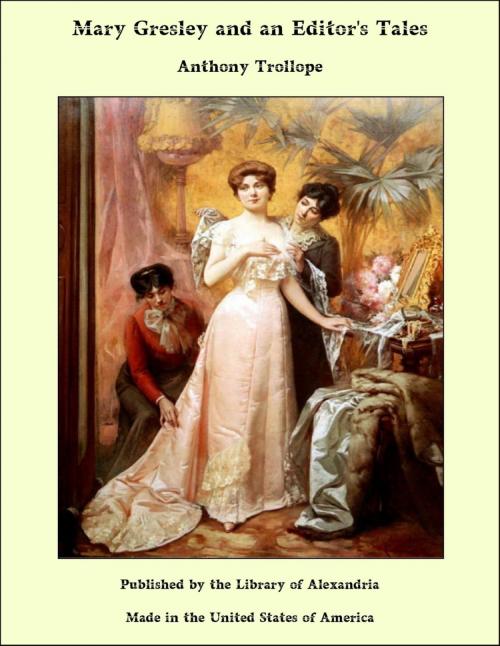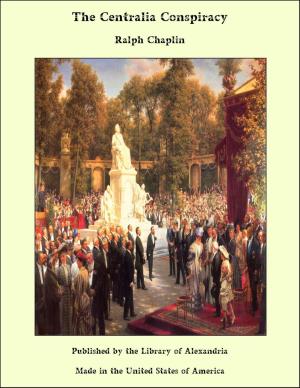Mary Gresley and an Editor's Tales
Nonfiction, Religion & Spirituality, New Age, History, Fiction & Literature| Author: | Anthony Trollope | ISBN: | 9781465616913 |
| Publisher: | Library of Alexandria | Publication: | March 8, 2015 |
| Imprint: | Language: | English |
| Author: | Anthony Trollope |
| ISBN: | 9781465616913 |
| Publisher: | Library of Alexandria |
| Publication: | March 8, 2015 |
| Imprint: | |
| Language: | English |
WE have known many prettier girls than Mary Gresley, and many handsomer women—but we never knew girl or woman gifted with a face which in supplication was more suasive, in grief more sad, in mirth more merry. It was a face that compelled sympathy, and it did so with the conviction on the mind of the sympathiser that the girl was altogether unconscious of her own power. In her intercourse with us there was, alas! much more of sorrow than of mirth, and we may truly say that in her sufferings we suffered; but still there came to us from our intercourse with her much of delight mingled with the sorrow; and that delight arose, partly no doubt from her woman’s charms, from the bright eye, the beseeching mouth, the soft little hand, and the feminine grace of her unpretending garments; but chiefly, we think, from the extreme humanity of the girl. She had little, indeed none, of that which the world calls society, but yet she was pre-eminently social. Her troubles were very heavy, but she was making ever an unconscious effort to throw them aside, and to be jocund in spite of their weight. She would even laugh at them, and at herself as bearing them. She was a little fair-haired creature, with broad brow and small nose and dimpled chin, with no brightness of complexion, no luxuriance of hair, no swelling glory of bust and shoulders; but with a pair of eyes which, as they looked at you, would be gemmed always either with a tear or with some spark of laughter, and with a mouth in the corners of which was ever lurking some little spark of humour, unless when some unspoken prayer seemed to be hanging on her lips. Of woman’s vanity she had absolutely none. Of her corporeal self, as having charms to rivet man’s love, she thought no more than does a dog. It was a fault with her that she lacked that quality of womanhood. To be loved was to her all the world; unconscious desire for the admiration of men was as strong in her as in other women; and her instinct taught her, as such instincts do teach all women, that such love and admiration was to be the fruit of what feminine gifts she possessed; but the gifts on which she depended,—depending on them without thinking on the matter,—were her softness, her trust, her woman’s weakness, and that power of supplicating by her eye without putting her petition into words which was absolutely irresistible. Where is the man of fifty, who in the course of his life has not learned to love some woman simply because it has come in his way to help her, and to be good to her in her struggles? And if added to that source of affection there be brightness, some spark of humour, social gifts, and a strong flavour of that which we have ventured to call humanity, such love may become almost a passion without the addition of much real beauty.
WE have known many prettier girls than Mary Gresley, and many handsomer women—but we never knew girl or woman gifted with a face which in supplication was more suasive, in grief more sad, in mirth more merry. It was a face that compelled sympathy, and it did so with the conviction on the mind of the sympathiser that the girl was altogether unconscious of her own power. In her intercourse with us there was, alas! much more of sorrow than of mirth, and we may truly say that in her sufferings we suffered; but still there came to us from our intercourse with her much of delight mingled with the sorrow; and that delight arose, partly no doubt from her woman’s charms, from the bright eye, the beseeching mouth, the soft little hand, and the feminine grace of her unpretending garments; but chiefly, we think, from the extreme humanity of the girl. She had little, indeed none, of that which the world calls society, but yet she was pre-eminently social. Her troubles were very heavy, but she was making ever an unconscious effort to throw them aside, and to be jocund in spite of their weight. She would even laugh at them, and at herself as bearing them. She was a little fair-haired creature, with broad brow and small nose and dimpled chin, with no brightness of complexion, no luxuriance of hair, no swelling glory of bust and shoulders; but with a pair of eyes which, as they looked at you, would be gemmed always either with a tear or with some spark of laughter, and with a mouth in the corners of which was ever lurking some little spark of humour, unless when some unspoken prayer seemed to be hanging on her lips. Of woman’s vanity she had absolutely none. Of her corporeal self, as having charms to rivet man’s love, she thought no more than does a dog. It was a fault with her that she lacked that quality of womanhood. To be loved was to her all the world; unconscious desire for the admiration of men was as strong in her as in other women; and her instinct taught her, as such instincts do teach all women, that such love and admiration was to be the fruit of what feminine gifts she possessed; but the gifts on which she depended,—depending on them without thinking on the matter,—were her softness, her trust, her woman’s weakness, and that power of supplicating by her eye without putting her petition into words which was absolutely irresistible. Where is the man of fifty, who in the course of his life has not learned to love some woman simply because it has come in his way to help her, and to be good to her in her struggles? And if added to that source of affection there be brightness, some spark of humour, social gifts, and a strong flavour of that which we have ventured to call humanity, such love may become almost a passion without the addition of much real beauty.















